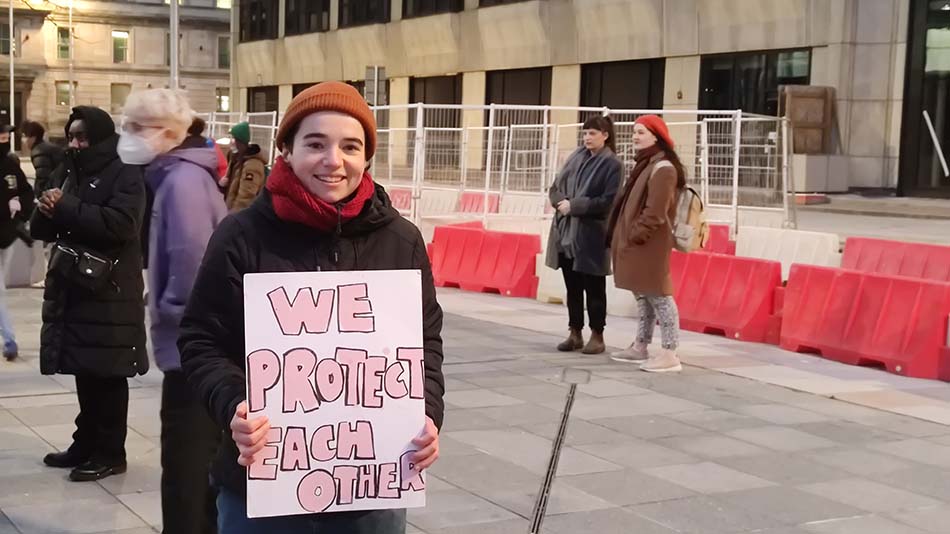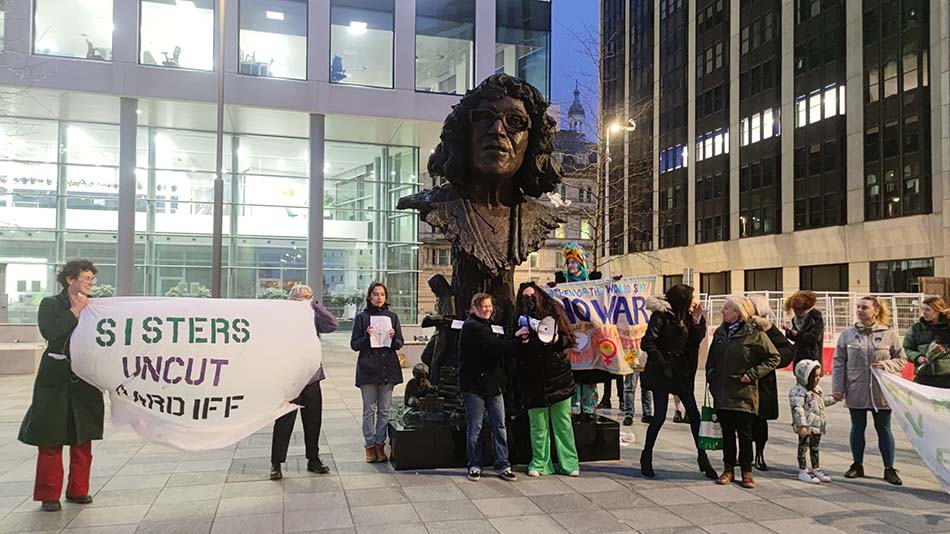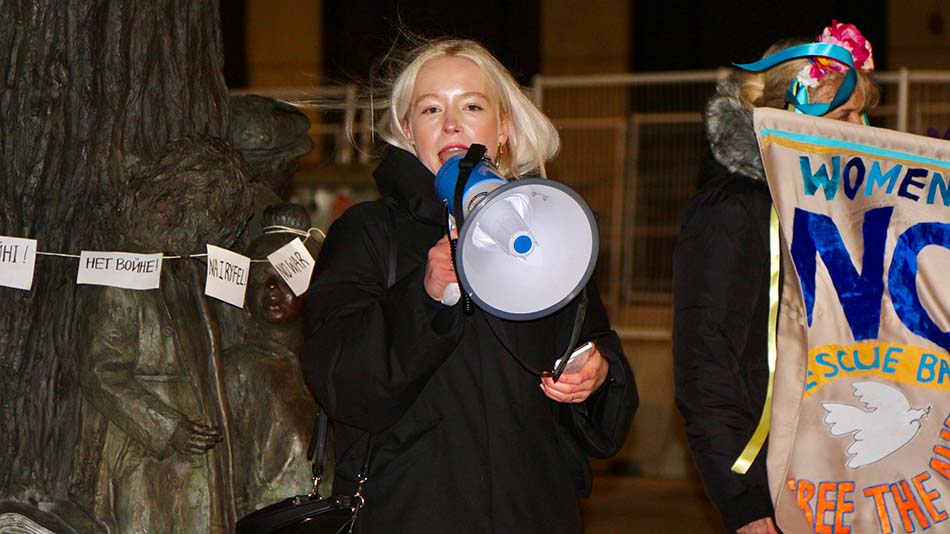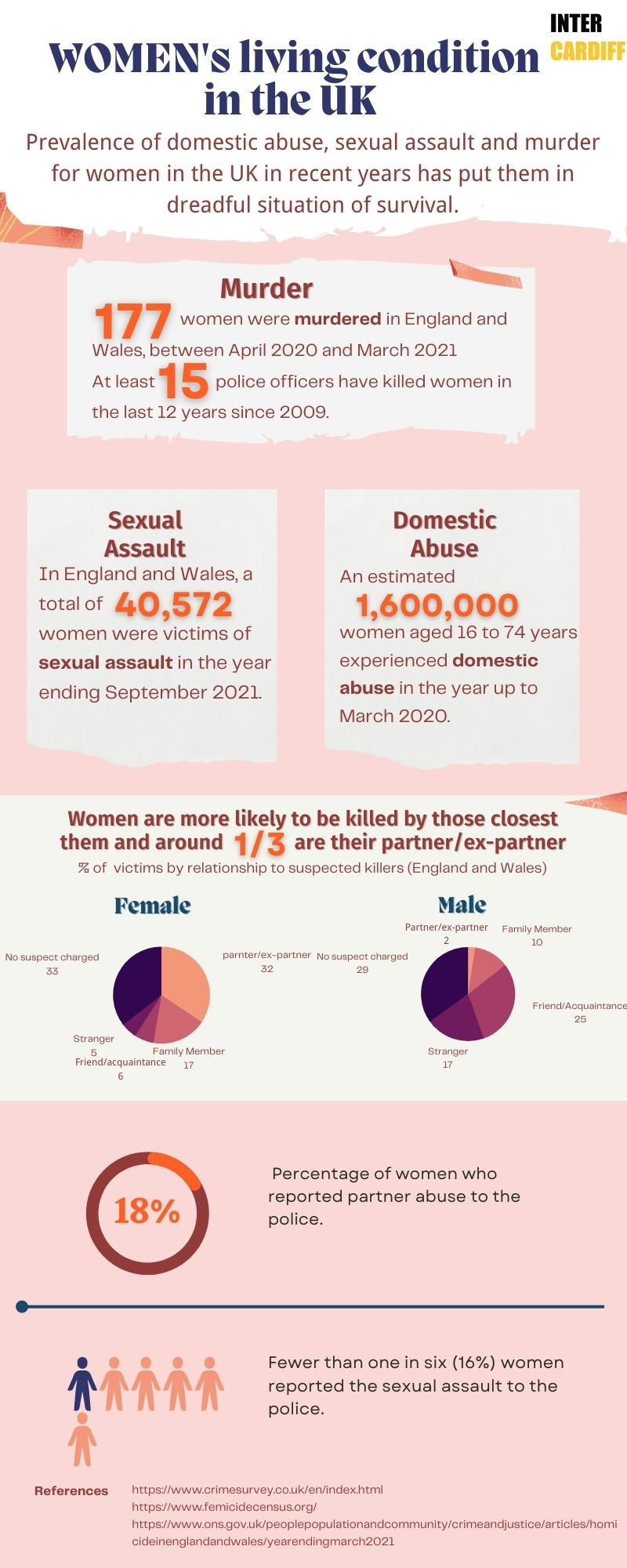A recent rally in Cardiff aimed to highlight the problems faced by victims of domestic and sexual abuse, many of whom are unfairly criminalized when they report their attacker to the police.

Bex’s husband grabbed her throat like a mob and strangled her, yelling at her. Bex struggled to get away from her husband and locked herself in the bathroom. With bruising around her neck, a split lip and visible cuts on her back, she called the police in desperation.
However, when she went downstairs to report her husband’s savage act to the police who arrived, the young policeman ignored her and talked only to her husband who kept saying, “She has a mental illness. She has gone crazy.” Bex was getting cross and shouted at her partner. The police immediately grabbed Bex’s arm and dragged her to a police car,
“They brought me to the police station for breach of the peace,” said Bex Coombs, who recalled her being arrested by the police after reporting her ex-husband’s domestic abuse against her at the age of 19.
Although the police eventually apologized to her and took her home with no charge, the 40-year-old domestic abuse survivor said her nightmare had just begun. “My ex used it against me and said ‘If you call them again, I’m just going to get you arrested.'” she said.
After that, she experienced eight years of domestic abuse which she had to remain silent and tolerate.
Things didn’t get changed until six years later, when she left her ex-husband after struggling to press change for quite a while. However, she still hadn’t escaped her ex-husband’s clutches. “When I left him in 2006, I had 18 months of stalking and harassment,” said Bex, adding that the police would just arrest him for being drunk and disorderly and released him the next day.
Bex has long since moved on from that abusive relationship and now joins organizations that offer support to victims of domestic and sexual abuse. She was telling her story at the “Women’s Strike Cymru 2022” protest to fight for women’s lives and freedom on International Women’s Day in Cardiff.
Despite having survived abuse herself, Bex still hears from other survivors who’ve had similar things that happen. “Most times the police believe in the men over believing what women are saying. We must have strict evidence. And it always takes years to bring the man to justice.”
According to Claudia Boes, the organizer of the protest, Bex’s case has been common in the UK, as it is difficult for women to get legal protection.
“We have a legal system that works against women partly because of the various procedures. Sexual assault and domestic violence are almost becoming legalized. So, conviction rates are really low,” said Claudia, a member of SistersUncut Caerdydd, a feminist group fighting for women’s safety.

The event launched on Tuesday titled “WE WANT TO LIVE”, demanded that no more women are murdered and unfairly criminalized when reporting sexual and domestic abuse against them and also protested against police violence.
Some protestors said that changes in British legislation could put more women at risk, referring to the Police, Crime, Sentencing, and Courts Bill(PCSC) proposed by the British government last year.
A report conducted by Agenda, the alliance for women and girls at risk, has warned that the proposed bill “risks criminalizing young women” who are in distress and need support.
“The bill could criminalize victims of sexual and domestic violence,” said Mabli Jones from the Welsh Language Society. “It gives the police more power to charge women with assault on people who are simply responding to a traumatic experience like suffering violence.”
Mabli repeated “Kill the Bill” in her speech, followed by the surrounding protestors chanting it in an outcry against the bill. The “Kill the Bill” protests are recent UK protests which emerged in response to the Police and Crime Bill. Protestors in Cardiff, along with protestors across the country, are all calling for the bill to be scrapped altogether.
Women’s being unfairly criminalized when reporting to the police has led to a low reporting rate. According to the Office for National Statistics, fewer than one in six (16%) women reported the sexual assault to the police while only 18% of women who had experienced partner abuse reported the abuse to the police.


Elian Hooper from Young Communist League said that the lack of legal deterrence against criminals and the following revenge on victims is another reason for women’s unwillingness to report. “I think because a trial doesn’t go ahead, and the criminal doesn’t get arrested. When they go back. It might become worse for them. So, they would rather keep silent.”
Bex said her husband’s abuse had intensified since she first reported it in 2000. “At first he just pushed me, slapped me, pulled my hair. But as the abuse increased, he started punching, kicking and throwing things,” she recalled. “Once he got drunk, he burst into the bathroom, screamed and dragged me into the sink, trying to drown me.”
In 2006, her husband was convicted of domestic violence for the first time. However, he just had a 12-month suspended sentence when he was convicted, and only served five months. “His family pressured me to drop the charges and stop him from getting into trouble, ” Bex said of what she called an unfair and unjust trial.
“I think it’s quite hard sometimes for women living in the situation to report it and then to stick with pressing the charges, ” she added.
“One in five women who have been raped or sexually assaulted or even murdered is created and sustained by the government’s lack of accountability and disregard for gender equality, ” said Mabli, based on which the police can violently arrest female victims rather than the attackers without legal basis, thus leading to the rampant domestic and sexual abuse that goes unpunished.

According to Claudia, despite women’s dreadful situation seeking legal aid, support services for domestic abuse and sexual assault are commonly underfunded and continue to be cut. “We are not getting enough money to fund services aiding women that are being run in Cardiff and Wales. Over the years, we’ve seen a massive underfunding of domestic violence shelters which have to switch over to early intervention.”
While the bill is now in its final stages in Parliament, campaigners hoped that even if it came into force, they could make changes to a legal system that is so detrimental to women’s survival.
Elias suggested that the police need a lot more training on women’s safety. “A lot of the issues that we’ve had have come from police officers. So, their attitudes towards women’s safety-related issues need to be improved a lot to make sure that women can put their trust in the police officers.”
Mabli said that community-based service is necessary for preventing violence against women. “Those services should be taken from the police to communities, which can provide more support for women’s safety and educate people to change attitudes towards things like sexual consent.”
She also believed the Welsh government could play a role to reverse the situation. The Senedd just voted to refuse consent for Westminster’s Nationality and Borders Bill this February. “They also voted against many of the provisions in the policing and crime bill. That’s really heartening and it’s a more socially just country,” said Mabli, “That’s a case of us really having to fight back, not only in the streets but in the Senedd as well.”
Claudia claimed that the campaigns can have an impact on the attitude of the Welsh government. “The Welsh government was the only government who had legislations on violence against women in their COVID recovery plan. So, I think as far as Cardiff is concerned, our campaigns do prompt the Welsh Government to stand up more against it.”
Bex, now married with three children, is a volunteer of Welsh Women’s Aid, a national charity in Wales to end violence against women and girls. She felt fully empowered when working with other domestic abuse survivors in the charity. “I hope to get my voice out there to help those who’ve had similar things happen and fight for their right of living. ”

